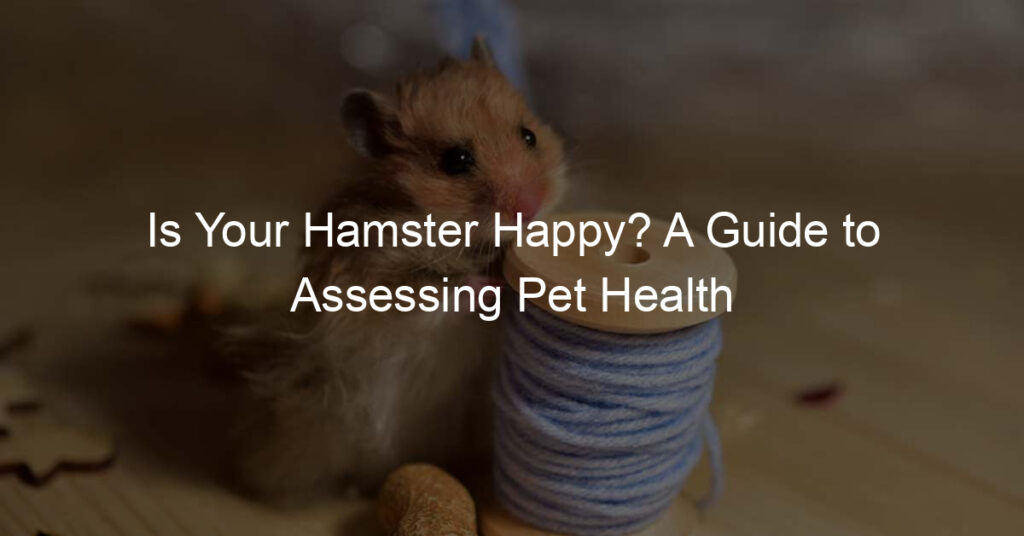
Introduction: The Importance of Pet Wellness
Our pets are more than just animals; they are part of our families. They bring joy, companionship, and a sense of responsibility into our lives. As pet owners, it is our duty to ensure that our pets are healthy and happy. This begins with understanding the importance of pet wellness and why regular health checks, particularly for hamsters, are crucial.
- Understanding the Importance of Pet Health
- Why Hamster Health Check is Crucial for Pet Owners
Just like humans, pets also require regular health check-ups to maintain their overall well-being. Regular vet visits can help detect potential health problems early, which can lead to more effective treatment and a longer, healthier life for your pet. This is particularly true for hamsters, who are prone to certain health issues that can be difficult to detect without a professional examination.
Hamsters, despite their small size, require just as much care and attention as any other pet. Regular health checks are crucial in ensuring your hamster is not only physically healthy, but also mentally and emotionally well. These checks can help identify any signs of stress, illness, or discomfort that may be affecting your hamster’s quality of life. Moreover, regular health checks can also provide an opportunity for pet owners to learn more about their hamster’s unique needs and behaviors, enabling them to provide the best possible care for their furry friend.
In conclusion, pet wellness, particularly for hamsters, is not something to be taken lightly. It requires a commitment to regular health checks and a deep understanding of your pet’s needs. By doing so, you can ensure that your pet lives a long, happy, and healthy life.
Understanding Hamster Behavior: Key to Assessing Hamster Health
Understanding your hamster’s behavior is crucial to assessing its health. Hamsters, like all animals, have unique behaviors that can tell us a lot about their well-being. Let’s explore some of the normal behaviors you should expect from a healthy hamster.
Normal Hamster Behavior
Hamsters are fascinating creatures with distinct behaviors. Here are some of the most common behaviors you should expect from your pet hamster:
- Active during the night: Hamsters are nocturnal creatures. This means they are most active during the night and sleep during the day. If your hamster is running on its wheel or exploring its cage at night, that’s a good sign of health.
- Constant gnawing: Hamsters have teeth that never stop growing. To keep their teeth at a manageable size, they need to gnaw on things. Regular gnawing is a sign of a healthy hamster. If your hamster stops gnawing, it might be a sign of dental problems.
- Regular grooming: Hamsters are clean animals. They spend a lot of time grooming themselves. Regular grooming is a sign of a healthy hamster. If your hamster stops grooming or grooms excessively, it might be a sign of skin problems or stress.
Observing these behaviors in your hamster can help you ensure that it is healthy and happy. Changes in these behaviors can be a sign of health problems and should prompt a visit to the vet.
Abnormal Hamster Behavior
Understanding your hamster’s behavior is crucial to assessing their health. While hamsters are known for their unique behaviors, certain actions may indicate an underlying health issue. Here are some abnormal behaviors to watch out for:
- Changes in Eating Habits
- Excessive Sleeping
- Unusual Aggression
Hamsters are known for their love of food. If you notice your hamster eating less or more than usual, it could be a sign of illness. A sudden change in their diet can also indicate stress or discomfort. Remember, a healthy hamster has a consistent eating pattern.
While hamsters are nocturnal creatures, sleeping more than usual during their active hours can be a sign of illness. If your hamster is sleeping excessively or seems lethargic when awake, it’s time to consult a vet.
Hamsters are generally peaceful creatures. If your hamster shows signs of unusual aggression, such as biting or scratching, it could be a sign of stress or illness. It’s important to address this behavior promptly to ensure your pet’s well-being.
Observing your hamster’s behavior can provide valuable insights into their health. If you notice any of these abnormal behaviors, it’s important to consult with a vet immediately. Remember, early detection is key to ensuring your hamster’s wellness.
| Abnormal Behavior | Possible Cause |
|---|---|
| Changes in Eating Habits | Illness, Stress, Discomfort |
| Excessive Sleeping | Illness, Lethargy |
| Unusual Aggression | Stress, Illness |
Understanding your hamster’s behavior is the first step in providing them with the care they need. Stay vigilant, and remember – a happy hamster is a healthy hamster.
Hamster Care: Ensuring Your Pet’s Health
When it comes to the health and happiness of your pet hamster, one of the most important factors is diet. A proper diet ensures that your hamster gets the nutrients it needs to stay active and healthy.
Proper Diet
Just like humans, hamsters need a balanced diet to stay healthy. Let’s delve into the importance of a balanced diet and what to feed your hamster.
- Importance of a balanced diet
- What to feed your hamster
A balanced diet is crucial for your hamster’s overall health. It helps maintain their energy levels, supports growth, and prevents diseases. According to a study, hamsters fed with a balanced diet showed improved health and lived longer than those who were not.
Hamsters are omnivores, which means they eat both plants and meat. A typical hamster diet should include a mix of fresh fruits, vegetables, grains, and a small amount of protein. Commercial hamster food, which usually comes in the form of pellets or seed mix, can also be a good source of nutrition. However, it’s important to ensure that the food is fresh and free from harmful chemicals.
Remember, a balanced diet is just one aspect of hamster care. Regular exercise, a clean habitat, and regular vet check-ups are also crucial for your pet’s health. By taking care of these aspects, you can ensure that your hamster lives a long, healthy, and happy life.
Regular Exercise
Just like humans, hamsters also need regular exercise to stay healthy and happy. Exercise helps to keep your hamster’s body fit and its mind alert. Let’s explore how you can provide exercise opportunities for your hamster and monitor its activity.
- Providing Exercise Opportunities
- Exercise Wheel: An exercise wheel is a must-have for every hamster cage. It allows your hamster to run as much as it likes, even when it’s inside the cage.
- Hamster Balls: Hamster balls are a great way to let your hamster explore outside its cage. Always supervise your hamster when it’s in the ball to ensure its safety.
- Playpen: A playpen provides a safe and enclosed space for your hamster to run around and explore. You can add toys and tunnels to make it more fun.
- Monitoring Your Hamster’s Activity
- Observe Your Hamster’s Behavior: Watch your hamster when it’s active. If it’s using the exercise wheel or playing in the playpen regularly, it’s getting enough exercise.
- Check for Signs of Fatigue: If your hamster is panting heavily, it may be overdoing it. Give it a break and ensure it has access to fresh water.
- Keep a Schedule: Hamsters are nocturnal, so they’re most active at night. Make sure the exercise opportunities are available during your hamster’s active hours.
Providing your hamster with plenty of opportunities to exercise is crucial. Hamsters are active creatures and they love to run, climb, and explore. Here are a few ways to ensure your hamster gets the exercise it needs:
While it’s important to provide your hamster with plenty of exercise opportunities, it’s equally important to monitor its activity. This helps you ensure that your hamster is getting enough exercise and not overdoing it. Here are a few tips:
In conclusion, regular exercise is a key part of hamster care. By providing plenty of exercise opportunities and monitoring your hamster’s activity, you can ensure your pet stays healthy and happy.
Hamster Health Tips: Spotting Signs of Illness
Just like humans, hamsters can also fall ill. It’s important to know the signs of a sick hamster so you can take action quickly. Let’s explore some of these signs and understand when it’s time to consult a vet.
- Signs of a Sick Hamster
- Changes in eating and drinking habits: If your hamster is eating or drinking less than usual, it could be a sign of illness.
- Change in activity level: A sick hamster may become less active or sleep more than usual.
- Changes in appearance: Look out for dull eyes, unkempt fur, or weight loss. These could indicate that your hamster is not feeling well.
- Unusual behavior: If your hamster is behaving differently, such as biting or hiding more than usual, it could be a sign of illness.
- When to Consult a Vet
Hamsters are usually active and playful. However, when they are not feeling well, their behavior can change. Here are some signs to look out for:
Remember, these are just some of the signs. If you notice anything unusual about your hamster’s behavior or appearance, it’s best to consult a vet.
It’s always better to be safe than sorry when it comes to your pet’s health. If you notice any of the above signs, or if your hamster just doesn’t seem like itself, it’s time to consult a vet. A professional can provide a proper diagnosis and treatment plan. Regular vet check-ups are also crucial to ensure your hamster’s health.
Remember, your hamster relies on you for its wellbeing. By keeping a close eye on its behavior and health, you can ensure your furry friend lives a happy and healthy life.
Pet Health Care: Regular Vet Check-ups
One of the most crucial aspects of maintaining your pet’s health, particularly for hamsters, is regular vet check-ups. These visits are more than just a routine; they are an opportunity to ensure that your pet is in the best possible health.
Importance of Regular Vet Visits
Regular vet visits are essential for several reasons. They not only provide a chance to monitor your pet’s health but also to prevent potential health issues from becoming serious problems. Let’s explore these reasons in detail:
- Preventive Care
- Early Detection of Potential Health Issues
Preventive care is a proactive approach to pet health. Regular vet visits allow for routine vaccinations, deworming, and flea and tick prevention, which are all crucial for a hamster’s health. These visits also provide an opportunity for the vet to examine your pet’s teeth, ears, and coat, which can often reveal early signs of health issues.
Regular vet check-ups can help detect potential health issues before they become severe. For instance, hamsters are prone to respiratory issues, which, if detected early, can be managed effectively. Vets can also identify signs of stress, which can lead to health problems if not addressed promptly.
In conclusion, regular vet check-ups are an integral part of pet health care. They not only ensure your hamster’s wellness but also provide peace of mind knowing that your pet is in good health. Remember, a healthy pet is a happy pet!
Hamster Wellness Tips: Maintaining a Healthy Environment
Creating a healthy environment for your hamster is crucial for its overall wellness. This involves keeping the cage clean and providing enough space for your hamster to move around. Let’s delve into these two important aspects of hamster care.
- Cleaning the Cage Regularly
Hamsters are clean animals, and they thrive in a clean environment. A dirty cage can lead to various health issues such as respiratory problems and skin infections. It’s recommended to clean your hamster’s cage at least once a week.
Start by removing your hamster and placing it in a safe, temporary environment. Empty the cage and clean it with a mild, pet-safe disinfectant. Rinse thoroughly and let it dry before adding fresh bedding. Remember to clean the food and water dishes too.
Regular cleaning not only ensures your hamster’s health but also helps to eliminate odors. It’s a simple yet effective way to maintain a healthy environment for your pet.
- Providing Enough Space for Your Hamster
Hamsters are active creatures. They need enough space to run, climb, and play. A small cage can lead to stress, obesity, and other health problems. Therefore, it’s important to provide a spacious home for your hamster.
The recommended minimum cage size for a hamster is 450 square inches of floor space, but bigger is always better. A larger cage allows for more toys and exercise equipment, which can help keep your hamster physically active and mentally stimulated.
Remember, a happy hamster is a healthy hamster. By providing a clean, spacious environment, you can ensure your pet’s wellness and longevity.
Conclusion: Pet Wellness Check for a Happy Hamster
In this guide, we’ve explored the various aspects of hamster health and wellness. We’ve learned about their behavior, care, health tips, and the importance of regular vet check-ups and maintaining a healthy environment. Now, let’s recap what we’ve learned and understand the importance of pet health assessment.
- Recap of hamster health guide:
- Importance of pet health assessment:
We started with understanding the importance of pet wellness and how it impacts the overall health and happiness of your hamster. We then delved into understanding hamster behavior as a key to assessing their health. We learned about the various aspects of hamster care, including diet, exercise, and grooming, and how these contribute to ensuring your pet’s health.
We also discussed the importance of spotting signs of illness early and how regular vet check-ups can help in this. Lastly, we learned about maintaining a healthy environment for your hamster, including the right bedding, temperature, and cleanliness.
Assessing your pet’s health regularly is crucial to ensure they are in their best shape. Regular health assessments can help detect any potential health issues early, allowing for timely treatment. It also helps in understanding your pet’s behavior better, making it easier for you to provide the right care and environment for them.
Remember, a happy hamster is a healthy hamster. So, keep a close eye on your little friend, provide them with the right care, and they will reward you with their adorable antics and companionship.
In conclusion, taking care of a hamster is a rewarding experience that comes with its own set of responsibilities. By following the guidelines mentioned in this guide, you can ensure your hamster stays healthy and happy. Remember, your hamster’s wellness is in your hands. So, make every pet wellness check count!








